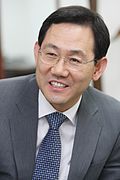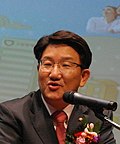Week 16. Wikipedia contribution - Yeonseo Koo (구연서)
Summarize
| 1 | 심재철 [47] | 2020년 2월 13일~2020년 5월 8일 |
정유경,이주빈 (2019년 12월 9일). “[속보] 자유한국당 신임 원내대표에 심재철 의원 선출”. 2025년 5월 23일에 확인함.
| 2 | 주호영 [48] | 2020년 5월 8일~2021년 4월 30일 |
“[속보] 통합당 21대 첫 원내대표 주호영 의원 선출”. 2020년 5월 8일. 2025년 5월 23일에 확인함.
| 3 | 김기현 [49] | 2021년 4월 30일~2022년 4월 8일 |
“김기현, 국민의힘 원내대표 선출…“내년 대선 승리””. 2021년 4월 30일. 2025년 5월 23일에 확인함.
| 4 | 권성동 [50] | 2022년 4월 8일~2022년 9월 19일 |
신수아 (2022년 4월 8일). “권성동, '윤심' 얻고 집권여당 첫 원내사령탑으로”. 2025년 5월 23일에 확인함.
| 5 | 주호영 [51] | 2022년 9월 19일~2023년 4월 6일 |
“국민의힘, 새 원내대표로 주호영 전 비대위원장 선출”. 2025년 5월 23일에 확인함.
| 6 | 윤재옥 [52] | 2023년 4월 7일~2024년 5월 9일 |
“[속보] 국민의힘 새 원내대표, TK 3선 윤재옥 의원 선출”. 2023년 4월 7일. 2025년 5월 23일에 확인함.
| 7 | 추경호 [53] | 2024년 5월 9일~2024년 12월 7일 |
심새롬 (2024년 5월 10일). “여당 새 원내대표, 부총리 출신 추경호…“108명 단일대오””. 2025년 5월 23일에 확인함.
| 8 | 권성동 [54] | 2024년 12월 12일~ |
전광준,신민정,이주빈 (2024년 12월 12일). “‘원조 친윤’ 권성동 다시 원내대표로…한 대표와 충돌 불가피”. 2025년 5월 23일에 확인함.
Here is English version:
| 1 | Shim Jae-chul (resigned) |  | 17 February 2020[169] | 8 May 2020 |
|---|
정유경,이주빈 (9 December 2019). "[속보] 자유한국당 신임 원내대표에 심재철 의원 선출". 한겨레 (in Korean). Retrieved 23 May 2025.
| 2 | Joo Ho-young |  | 8 May 2020[170] | 30 April 2021 |
|---|
"[속보] 통합당 21대 첫 원내대표 주호영 의원 선출". 경향신문 (in Korean). 8 May 2020. Retrieved 23 May 2025.
| 3 | Kim Gi-hyeon |  | 30 April 2021[171] | 8 April 2022 |
|---|
"김기현, 국민의힘 원내대표 선출…"내년 대선 승리"". 동아일보 (in Korean). 30 April 2021. Retrieved 23 May 2025.
| 4 | Kweon Seong-dong |  | 8 April 2022[172] | 19 September 2022 |
|---|
신수아 (8 April 2022). "권성동, '윤심' 얻고 집권여당 첫 원내사령탑으로". MBC NEWS (in Korean). Retrieved 23 May 2025.
| 5 | Joo Ho-young |  | 19 September 2022[173] | 7 April 2023 |
|---|
"국민의힘, 새 원내대표로 주호영 전 비대위원장 선출". KBS 뉴스 (in Korean). Retrieved 23 May 2025.
| 6 | Yoon Jae-ok |  | 7 April 2023[174] | 9 May 2024 |
|---|
"[속보] 국민의힘 새 원내대표, TK 3선 윤재옥 의원 선출". 한국일보 (in Korean). 7 April 2023. Retrieved 23 May 2025.
| 7 | Choo Kyung-ho |  | 9 May 2024[175] | 7 December 2024 |
|---|
심새롬 (10 May 2024). "여당 새 원내대표, 부총리 출신 추경호…"108명 단일대오"". 중앙일보 (in Korean). Retrieved 23 May 2025.
| 8 | Kweon Seong-dong |  | 12 December 2024[176] | Incumbent |
|---|
전광준 (12 December 2024). "'원조 윤핵관' 권성동 국민의힘 원내대표 선출". 한겨레 (in Korean). Retrieved 23 May 2025.
New, interesting, or unusual items learned
The rise of far-right parties in Europe is causing concern. Examples include Alternative for Germany (AfD) in Germany, the National Rally in France, and Brothers of Italy in Italy. Most far-right parties are rooted in anti-immigration sentiments and nationalism. However, in South Korea, far-right parties tend to be characterized more by anti-communism than by anti-immigration. Why is that? Is it because of the historical context of war and division with North Korea?
Yes, the historical context of division and war with North Korea plays a key role in shaping South Korea’s far-right politics. Unlike Europe, where far-right parties often focus on anti-immigration and nationalism, South Korea’s far-right tends to emphasize strong anti-communism. This is largely due to the Korean War and the ongoing threat from the North. As a result, communism is often associated with national security threats. This unique geopolitical situation has shaped conservative ideology in a different direction.
ReplyDelete